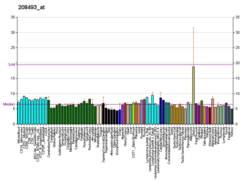HOXA11
Homeobox protein Hox-A11 is a protein that in humans is encoded by the HOXA11 gene.[5][6][7]
Function
[edit]In vertebrates, the genes encoding the class of transcription factors called homeobox genes are found in clusters named A, B, C, and D on four separate chromosomes. Expression of these proteins is spatially and temporally regulated during embryonic development. This gene is part of the A cluster on chromosome 7 and encodes a DNA-binding transcription factor which may regulate gene expression, morphogenesis, and differentiation. This gene is involved in the regulation of uterine development and is required for female fertility. Mutations in this gene can cause radioulnar synostosis with amegakaryocytic thrombocytopenia.[7]
See also
[edit]References
[edit]- ^ a b c GRCh38: Ensembl release 89: ENSG00000005073 – Ensembl, May 2017
- ^ a b c GRCm38: Ensembl release 89: ENSMUSG00000038210 – Ensembl, May 2017
- ^ "Human PubMed Reference:". National Center for Biotechnology Information, U.S. National Library of Medicine.
- ^ "Mouse PubMed Reference:". National Center for Biotechnology Information, U.S. National Library of Medicine.
- ^ McAlpine PJ, Shows TB (Jul 1990). "Nomenclature for human homeobox genes". Genomics. 7 (3): 460. doi:10.1016/0888-7543(90)90186-X. PMID 1973146.
- ^ Scott MP (Nov 1992). "Vertebrate homeobox gene nomenclature". Cell. 71 (4): 551–3. doi:10.1016/0092-8674(92)90588-4. PMID 1358459. S2CID 13370372.
- ^ a b "Entrez Gene: HOXA11 homeobox A11".
Further reading
[edit]- Daftary GS, Taylor HS (2001). "Implantation in the human: the role of HOX genes". Seminars in Reproductive Medicine. 18 (3): 311–20. doi:10.1055/s-2000-12568. PMID 11299969. S2CID 22470881.
- Daftary GS, Taylor HS (Jun 2001). "Molecular markers of implantation: clinical implications". Current Opinion in Obstetrics and Gynecology. 13 (3): 269–74. doi:10.1097/00001703-200106000-00004. PMID 11396649. S2CID 30091061.
- Davies JA, Fisher CE (2002). "Genes and proteins in renal development". Experimental Nephrology. 10 (2): 102–13. doi:10.1159/000049905 (inactive 1 November 2024). PMID 11937757. S2CID 22273851.
{{cite journal}}: CS1 maint: DOI inactive as of November 2024 (link) - Eun Kwon H, Taylor HS (Dec 2004). "The role of HOX genes in human implantation". Annals of the New York Academy of Sciences. 1034 (1): 1–18. Bibcode:2004NYASA1034....1E. doi:10.1196/annals.1335.001. PMID 15731295. S2CID 41501204.
- Acampora D, D'Esposito M, Faiella A, Pannese M, Migliaccio E, Morelli F, Stornaiuolo A, Nigro V, Simeone A, Boncinelli E (Dec 1989). "The human HOX gene family". Nucleic Acids Research. 17 (24): 10385–402. doi:10.1093/nar/17.24.10385. PMC 335308. PMID 2574852.
- Miano JM, Firulli AB, Olson EN, Hara P, Giachelli CM, Schwartz SM (Jan 1996). "Restricted expression of homeobox genes distinguishes fetal from adult human smooth muscle cells". Proceedings of the National Academy of Sciences of the United States of America. 93 (2): 900–5. Bibcode:1996PNAS...93..900M. doi:10.1073/pnas.93.2.900. PMC 40155. PMID 8570656.
- Apiou F, Flagiello D, Cillo C, Malfoy B, Poupon MF, Dutrillaux B (1996). "Fine mapping of human HOX gene clusters". Cytogenetics and Cell Genetics. 73 (1–2): 114–5. doi:10.1159/000134320. PMID 8646877.
- Potter SS, Branford WW (Oct 1998). "Evolutionary conservation and tissue-specific processing of Hoxa 11 antisense transcripts". Mammalian Genome. 9 (10): 799–806. doi:10.1007/s003359900870. PMID 9745033. S2CID 9107678.
- Taylor HS, Igarashi P, Olive DL, Arici A (Mar 1999). "Sex steroids mediate HOXA11 expression in the human peri-implantation endometrium". The Journal of Clinical Endocrinology and Metabolism. 84 (3): 1129–35. doi:10.1210/jcem.84.3.5573. PMID 10084606.
- Thompson AA, Nguyen LT (Dec 2000). "Amegakaryocytic thrombocytopenia and radio-ulnar synostosis are associated with HOXA11 mutation". Nature Genetics. 26 (4): 397–8. doi:10.1038/82511. PMID 11101832. S2CID 38963628.
- Shen WF, Krishnan K, Lawrence HJ, Largman C (Nov 2001). "The HOX homeodomain proteins block CBP histone acetyltransferase activity". Molecular and Cellular Biology. 21 (21): 7509–22. doi:10.1128/MCB.21.21.7509-7522.2001. PMC 99922. PMID 11585930.
- Fujino T, Suzuki A, Ito Y, Ohyashiki K, Hatano Y, Miura I, Nakamura T (Feb 2002). "Single-translocation and double-chimeric transcripts: detection of NUP98-HOXA9 in myeloid leukemias with HOXA11 or HOXA13 breaks of the chromosomal translocation t(7;11)(p15;p15)". Blood. 99 (4): 1428–33. doi:10.1182/blood.V99.4.1428. PMID 11830496.
- Fleischman RA, Letestu R, Mi X, Stevens D, Winters J, Debili N, Vainchenker W (Feb 2002). "Absence of mutations in the HoxA10, HoxA11 and HoxD11 nucleotide coding sequences in thrombocytopenia with absent radius syndrome". British Journal of Haematology. 116 (2): 367–75. doi:10.1046/j.1365-2141.2002.03263.x. PMID 11841440. S2CID 46162989.
- Kosaki K, Kosaki R, Suzuki T, Yoshihashi H, Takahashi T, Sasaki K, Tomita M, McGinnis W, Matsuo N (Feb 2002). "Complete mutation analysis panel of the 39 human HOX genes". Teratology. 65 (2): 50–62. doi:10.1002/tera.10009. PMID 11857506.
- Chau YM, Pando S, Taylor HS (Jun 2002). "HOXA11 silencing and endogenous HOXA11 antisense ribonucleic acid in the uterine endometrium". The Journal of Clinical Endocrinology and Metabolism. 87 (6): 2674–80. doi:10.1210/jcem.87.6.8527. PMID 12050232.
External links
[edit]- HOXA11+protein,+human at the U.S. National Library of Medicine Medical Subject Headings (MeSH)
This article incorporates text from the United States National Library of Medicine, which is in the public domain.






